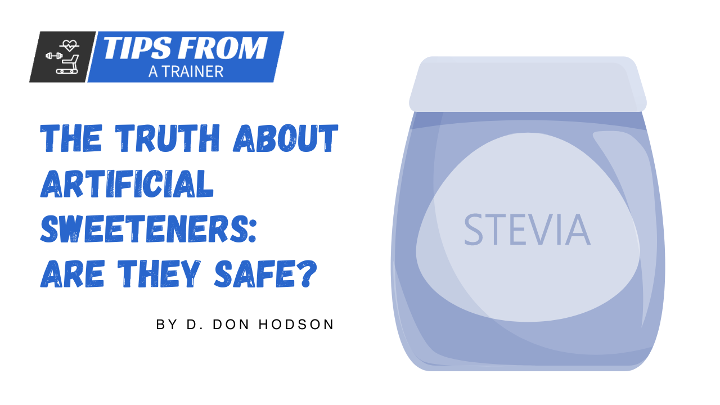Introduction
Artificial sweeteners have become increasingly popular as sugar substitutes in various food and beverage products. They offer the promise of sweetness without the added calories of sugar, making them appealing to individuals seeking to reduce their sugar intake or manage conditions like diabetes.
However, concerns and controversies surrounding the safety of artificial sweeteners have led to debates among health experts and consumers alike. In this article, we will delve into the truth about artificial sweeteners and explore the scientific evidence surrounding their safety.
Table of Contents
Introduction
Understanding Artificial Sweeteners
What Are Artificial Sweeteners?
The Role of Artificial Sweeteners in the Food Industry
The Safety Debate: Examining the Evidence
Regulatory Approval and Acceptable Daily Intake (ADI)
Research Studies on Artificial Sweeteners
Artificial Sweeteners and Weight Management
Potential Health Risks and Concerns
Metabolic Effects and Blood Sugar Regulation
Gut Health and Microbiota
Potential Allergies and Sensitivities
Safe Usage Guidelines and Natural Alternatives
Safe Usage Guidelines
Natural Alternatives to Artificial Sweeteners
Debunking Common Myths and Misconceptions
Myth: Artificial Sweeteners Cause Cancer
Myth: Artificial Sweeteners Cause Weight Gain
Conclusion

Understanding Artificial Sweeteners
What are Artificial Sweeteners?
Artificial sweeteners, also known as non-nutritive sweeteners, are synthetic compounds that provide a sweet taste to food and beverages without contributing a significant amount of calories. These substances are highly sweet, often hundreds of times sweeter than sugar, allowing for a smaller quantity to be used in products. Common examples of artificial sweeteners include aspartame, sucralose, saccharin, and stevia.
The Role of Artificial Sweeteners in the Food Industry
Artificial sweeteners are extensively used in the food and beverage industry for several reasons. One primary purpose is to reduce the calorie content of products, catering to individuals seeking to manage their weight or reduce sugar consumption. They are also used in foods and drinks marketed specifically to individuals with diabetes or those following a low-sugar or sugar-free diet. By incorporating artificial sweeteners, manufacturers can provide sweet-tasting products with fewer calories than their sugar-sweetened counterparts.
Artificial sweeteners can be found in a wide range of processed foods and beverages, including diet sodas, sugar-free desserts, low-calorie snacks, and various other "diet" or "lite" products. They are often combined with other sugar substitutes or natural sweeteners to enhance taste and provide a desirable sensory experience.
It's important to note that not all artificial sweeteners have the same level of sweetness or taste profile. Some may have a slightly different aftertaste, and individuals may have preferences based on personal experience. Understanding the various types of artificial sweeteners can help individuals make informed choices based on their preferences and dietary needs.
While artificial sweeteners offer an alternative to sugar, the key question remains: Are they safe for consumption? In the following sections, we will delve into the scientific evidence and examine the safety concerns associated with artificial sweeteners.
The Safety Debate: Examining the Evidence
Regulatory Approval and Acceptable Daily Intake (ADI)
Before artificial sweeteners are approved for use in food and beverages, they undergo rigorous testing and evaluation by regulatory agencies such as the U.S. Food and Drug Administration (FDA), the European Food Safety Authority (EFSA), and similar organizations worldwide. These regulatory bodies review comprehensive safety data, including studies on toxicity, metabolism, and potential health effects, to establish guidelines and set acceptable intake levels.
One important concept in evaluating the safety of artificial sweeteners is the Acceptable Daily Intake (ADI). ADI represents the maximum amount of an artificial sweetener that can be safely consumed on a daily basis over a lifetime without adverse health effects. It is typically expressed in milligrams per kilogram of body weight. The ADI takes into account the most sensitive populations and includes a significant safety margin to ensure consumer safety.
Research Studies on Artificial Sweeteners
Numerous scientific studies have investigated the safety of artificial sweeteners. The bulk of the evidence suggests that when consumed within the recommended intake levels, artificial sweeteners are generally safe for human consumption.
Some studies have raised concerns about potential health risks associated with artificial sweeteners, such as a possible link to certain cancers or negative effects on metabolism. However, it's important to critically evaluate these studies and consider the overall body of research. Many of these studies have limitations, such as small sample sizes, animal studies that may not directly translate to humans, or the use of unrealistically high doses that exceed typical human consumption levels.
The FDA, EFSA, and other regulatory agencies have extensively reviewed the available scientific literature and concluded that, when used as directed, artificial sweeteners are safe for the general population. It's worth noting that individuals with specific health conditions, such as phenylketonuria (PKU) or rare sensitivities, may need to avoid certain artificial sweeteners. However, for the majority of the population, artificial sweeteners can be consumed safely and without significant health risks.
Artificial Sweeteners and Weight Management
One of the primary reasons individuals turn to artificial sweeteners is their potential role in weight management. Since artificial sweeteners provide sweetness without the calories of sugar, they can be an attractive option for reducing overall calorie intake and managing weight.
Several studies have examined the effects of artificial sweeteners on appetite, food cravings, and weight gain. While some studies suggest that artificial sweeteners may help reduce calorie intake and support weight loss efforts, others have reported mixed findings. Some research suggests that artificial sweeteners might not lead to the expected calorie reduction due to compensatory behaviors, such as increased hunger or consumption of additional calories from other sources.
Overall, the relationship between artificial sweeteners and weight management is complex and individualized. Factors such as overall diet quality, lifestyle habits, and personal preferences play crucial roles in determining the impact of artificial sweeteners on weight. It's important for individuals to listen to their bodies, be mindful of overall calorie intake, and adopt a balanced diet that includes a variety of nutrient-dense whole foods.
Potential Health Risks and Concerns
Metabolic Effects and Blood Sugar Regulation
One concern often raised about artificial sweeteners is their potential impact on metabolism and blood sugar regulation. Some studies have suggested that artificial sweeteners might disrupt the body's ability to regulate blood sugar levels, leading to metabolic imbalances. However, the overall evidence in humans is inconclusive, and the mechanisms by which artificial sweeteners may affect metabolism are still not fully understood.
It's worth noting that artificial sweeteners have been extensively studied in individuals with diabetes, and they are generally considered safe for consumption in moderation. In fact, they can be valuable tools for individuals who need to manage their blood sugar levels and reduce overall sugar intake. Nonetheless, it's important for individuals with diabetes to monitor their blood sugar levels and consult with healthcare professionals to determine the most suitable dietary choices.
Gut Health and Microbiota
The gut microbiota, a diverse community of microorganisms residing in the gastrointestinal tract, plays a crucial role in overall health. Some studies have suggested that artificial sweeteners may have an impact on gut health and the composition of the gut microbiota. However, the research in this area is still evolving, and the long-term effects of artificial sweeteners on gut health are not yet fully understood.
While some studies have reported associations between artificial sweetener consumption and changes in the gut microbiota, it's important to note that these studies often involve animal models or small human populations. More research is needed to establish definitive conclusions and understand the potential implications for human health.
Potential Allergies and Sensitivities
Like any food or food ingredient, artificial sweeteners can potentially trigger allergic reactions or sensitivities in certain individuals. For example, some people may have an intolerance to specific artificial sweeteners, such as aspartame or saccharin. In rare cases, individuals with phenylketonuria (PKU), a genetic disorder, need to avoid the artificial sweetener aspartame due to its phenylalanine content.
If you suspect an allergy or sensitivity to artificial sweeteners, it is important to consult with a healthcare professional for proper diagnosis and guidance. They can help identify potential triggers and recommend suitable alternatives or dietary modifications.
Safe Usage Guidelines and Natural Alternatives
Safe Usage Guidelines
To ensure the safe consumption of artificial sweeteners, it is recommended to follow usage guidelines provided by regulatory agencies. These guidelines typically specify the acceptable daily intake (ADI) for each artificial sweetener, which represents the maximum amount considered safe for daily consumption over a lifetime.
It's important to note that ADIs are established with significant safety margins and are intended to cover all population groups, including sensitive individuals. Adhering to these guidelines can help individuals enjoy the benefits of artificial sweeteners without exceeding safe levels of consumption.
Additionally, it is advisable to read food labels carefully to be aware of the types and amounts of artificial sweeteners present in products. Being mindful of overall intake from various sources can help maintain moderation and prevent excessive consumption.
Natural Alternatives to Artificial Sweeteners
For individuals who prefer to avoid artificial sweeteners altogether or are looking for natural alternatives, several options are available. These natural sweeteners provide a sweet taste and can be used as substitutes in cooking, baking, and beverages. Some popular natural alternatives to artificial sweeteners include:
Stevia
Stevia is a plant-derived sweetener that has gained popularity due to its intense sweetness without contributing calories. It is available in powdered or liquid form and can be used in various recipes.
Monk Fruit Extract
Monk fruit extract, also known as Luo Han Guo, is derived from the monk fruit and provides sweetness without calories. It is available as a powdered sweetener and can be used in a similar way to sugar.
Erythritol
Erythritol is a sugar alcohol that occurs naturally in certain fruits and vegetables. It provides sweetness with a reduced calorie content compared to sugar. Erythritol is available as a granulated or powdered sweetener and can be used in baking and beverages.
Natural sweeteners offer an alternative for individuals who prefer to avoid artificial additives or have specific dietary preferences. However, it's important to note that natural sweeteners may still have an impact on blood sugar levels and should be used in moderation.
Debunking Common Myths and Misconceptions
Myth: Artificial Sweeteners Cause Cancer
One of the most persistent myths surrounding artificial sweeteners is their alleged link to cancer. This misconception originated from early studies conducted in the 1970s that suggested a potential connection between artificial sweeteners and cancer in laboratory rats. However, subsequent research has failed to establish a definitive causal relationship between artificial sweetener consumption and cancer in humans.
Regulatory agencies, such as the FDA and EFSA, have extensively reviewed the available evidence and concluded that artificial sweeteners, when used within the recommended intake levels, do not pose a significant cancer risk to humans. Long-term human studies and comprehensive reviews of scientific literature have consistently shown no clear evidence of increased cancer risk associated with artificial sweetener consumption.
It's important to distinguish between scientific research conducted on animals, which may use unrealistically high doses or differ in metabolic processes, and studies conducted on humans, which provide more accurate insights into potential health effects. Based on the available evidence, artificial sweeteners, when used as directed, can be considered safe and do not appear to significantly increase the risk of cancer.
Myth: Artificial Sweeteners Cause Weight Gain
Another common misconception is that artificial sweeteners can actually lead to weight gain instead of weight loss. This belief stems from the idea that consuming foods or beverages sweetened with artificial sweeteners may trigger cravings for sweet or high-calorie foods, leading to overeating and weight gain.
However, the overall body of scientific evidence does not support the notion that artificial sweeteners directly cause weight gain. In fact, artificial sweeteners can be valuable tools for individuals looking to reduce their calorie intake and manage their weight. They provide sweetness without adding significant calories, which can help individuals maintain a lower overall energy intake and support weight loss or weight maintenance efforts.
It's important to note that individual responses to artificial sweeteners may vary. Some people may find that consuming artificial sweeteners increases their cravings or desire for sweet foods, while others may not experience any adverse effects. As with any dietary choice, it's essential to listen to your body, be mindful of overall calorie intake, and maintain a balanced diet that includes a variety of nutrient-dense foods.
Conclusion
In conclusion, artificial sweeteners, when used in moderation and within the recommended intake levels, are generally considered safe for human consumption. Regulatory agencies such as the FDA and EFSA have conducted extensive reviews of the scientific evidence and have established guidelines to ensure consumer safety.
While concerns have been raised about potential health risks associated with artificial sweeteners, the bulk of scientific research supports their safety when used as directed. Studies examining the metabolic effects, blood sugar regulation, and potential impact on weight management have provided mixed results, but overall, artificial sweeteners do not appear to pose significant risks to human health.
It's important to remember that individual responses to artificial sweeteners may vary, and certain individuals with specific health conditions or sensitivities may need to avoid or limit their consumption. Consulting with healthcare professionals can provide personalized guidance based on individual health circumstances.
Ultimately, the choice to consume artificial sweeteners or seek natural alternatives is a personal decision. Natural sweeteners, such as stevia or monk fruit extract, offer options for individuals who prefer to avoid artificial additives. However, it's crucial to note that natural sweeteners also have potential effects on blood sugar levels and should be used in moderation.
As with any aspect of a balanced diet, the key lies in moderation, mindful consumption, and a focus on overall dietary quality. By maintaining a well-rounded and varied diet that emphasizes whole foods, individuals can make informed choices about artificial sweetener use that align with their preferences and health goals.

Don Hodson, Certified Personal Trainer
I'm Don, an ACE-certified personal trainer and the founder of Tips From A Trainer. With my passion for fitness and years of experience, I've helped countless individuals transform their physiques!
Having personally overcome weight challenges throughout my life, I understand the struggle. Through consistency, exercise, and a balanced diet, I have managed to stay in shape and I want to share my message with the world!
The fitness industry is fraught with misconceptions and deceptive practices, which is why I am committed to providing you with the truth.
- My Site: www.Don-Hodson.com
- My Company: www.ConnectedAgeMarketing.com

The Truth About Artificial Sweeteners